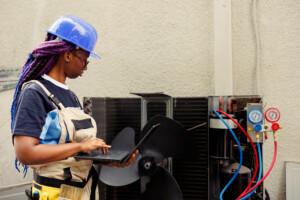HVAC (Heating, Ventilation, and Air Conditioning) is responsible for maintaining comfortable air temperatures inside your home. Understanding how long HVAC systems last is essential for homeowners, as it impacts your household budget and utility costs. In this blog, we’ll examine the lifespan of residential HVAC equipment and the factors that affect its performance and longevity.
Average Lifespan of Your HVAC Systems
Climate systems are complex, with a wide range of components reliant on each other to keep your home cool, cozy, and clean. Though they may perform similar functions, no two HVAC systems are exactly alike. As a result, their average life expectancy can differ substantially depending on which one you have installed in your home.
- Window Air Conditioner. A window air conditioner will typically last 10-15 years. Due to their simple construction, they’re inexpensive and easy to install. However, their light-duty components typically wear down faster than those in larger systems, especially when exposed to the elements.
- Central Air Conditioner. Central AC units generally last 12-17 years. Even though they’re normally installed outdoors, their robust components keep them functioning even when exposed to dust, dirt, and inclement weather.
- Furnaces. Because their central components are made from brass, copper, fiberglass, stainless steel, and aluminum (materials with high heat resistance), a typical furnace lasts 15-20 years.
- Heat Pumps. Heat pumps last 10-16 years on average. Because they transfer heat instead of generating it, their operating temperature remains fairly low. And since they contain few moving parts, they generally require fewer repairs than an oil or gas furnace.
- Boilers. Most boilers last 15-35 years because they maintain a consistent internal temperature and cycle less often than comparable heating systems.
- Thermostats. Thermostats usually last around ten years. However, installing them in a location where they’re exposed to moisture or UV light can damage their electronic and mechanical components, shortening their lifespan.
No matter which unit you own, understanding its lifespan will help you anticipate repair costs and which system to choose when the time comes to upgrade. Monitoring its performance ensures you won’t be surprised as the system nears the end of its life.
Factors That Affect HVAC Lifespan
Though the quality of your HVAC system matters (high-quality systems last longer than low-quality ones), environment and personal habits play a much larger role. For homeowners looking to get the most from their equipment, here are major factors to consider.
- Maintenance. Regular maintenance is the best way to extend the life of your heating, ventilation, and air conditioning units. Besides cleaning and lubricating your systems, an HVAC technician will also check refrigerant levels and inspect vital components, such as the compressor, condenser, and heat exchanger, to ensure they’re working properly.
- Changing Air Filters. Clogged filters impede airflow, forcing the motor to work harder to maintain circulation. Fortunately, filters are cheap and can be replaced without an HVAC professional.
- Ductwork. Ventilation ducts can also collect dust. Without routine maintenance, debris can build up and restrict air currents, causing your system to run longer in order to reach your desired temperature.
- Home Insulation. Poorly insulated homes are not energy efficient. They allow heat to creep in during summer and warm air to escape during winter. If you have an old home, upgrading your insulation will lessen the strain on your HVAC equipment.
- Drafts. It’s not uncommon for homes to develop gaps in walls, ceilings, doors, and windows. Sealing them prevents energy loss, making it easier to maintain stable indoor temperatures.
- Climate. HVAC systems in humid climates typically experience more corrosion. Fans, blowers, condenser coils, and refrigerant lines are most vulnerable. Units in coastal areas also have to deal with salt, which accelerates the process.
- Temperature Settings. Setting the thermostat extremely high or extremely low can lead to short cycling, where the system turns on and off constantly, leading to excessive wear.
When to Replace Your HVAC System
With proper maintenance, HVAC equipment can last for decades. However, even the best wear out eventually. Here are the signs it’s finally time to purchase a new heating or cooling system.
- Uneven Temperatures. Furnaces and air conditioning units are supposed to distribute warm and cool air evenly throughout your home. If some parts of your house are stuffy while others are freezing, it’s a sign their machinery is too weak to produce consistent airflow.
- Higher Energy Bills. As systems age, their heating and cooling cycles become longer and longer, gradually driving up energy consumption.
- Frequent Repairs. Worn components break more often. If your system requires constant tune-ups and repairs, it may be cheaper to simply replace it.
- Decreased Air Quality. Visible dust in the air and around vents indicates the system has accumulated so much debris it can no longer produce clean air.
- Odd Noises and Strange Smells. HVAC units are designed to operate quietly. Grinding, banging, rattling, hissing, clicking, or popping are a sign the unit’s basic mechanisms have begun to fail. Drain leaks can also increase your risk of mold and mildew, leading to unpleasant odors.
Installing a new HVAC system can be expensive. In addition to ensuring proper maintenance of your system, watch for signs of aging so you can plan ahead and explore financing options if needed.
Save on HVAC Repairs with Agway
HVAC maintenance can be costly. Make sure you’re protected with Agway EnergyGuard™. EnergyGuard™ covers your heating, cooling, and electrical systems from the wear and tear of daily use. Home insurance doesn’t cover this type of damage, but we do.
When the need for repair occurs, our customers don’t waste time hunting around for a qualified repairman. They call us instead. Our service team maintains a network of HVAC contractors in your area and sends the first available one straight to your door. There are no service fees or deductibles either. We pay for the visit and all covered parts. Sign up today and start saving on home repairs with Agway EnergyGuard™!
